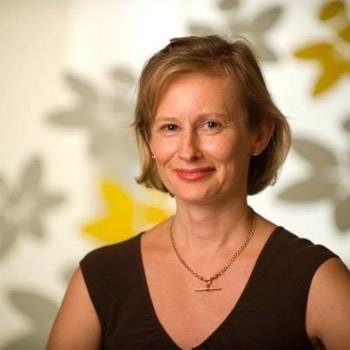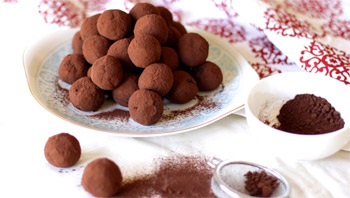Kathy Chapman Australia's Biggest Morning Tea Interview

Kathy Chapman Australia's Biggest Morning Tea Interview
When it comes to beating cancer, we all have what it takes to help. You can make a difference this May by hosting a biggest morning tea and supporting the 1 in 2 Australians who will be diagnosed with cancer by age 85.
Getting involved is easy. Simply get together with your friends, family or workmates, put the kettle on and make your cuppa count.
Register at www.biggestmorningtea.com.au or call 1300 65 65 85 and help support Cancer Council's vital work. You'll receive a free host kit packed with fundraising ideas, party tips, mouth-watering recipes from celebrity chefs and everything you need to get started.
Everyone has a different reason to host a morning tea. Cancer survivor Natalie Khoury hosted her first morning tea for Cancer Council last year after finishing treatment for Hodgkin lymphoma. She found the experience incredibly rewarding.
'I hosted a Biggest Morning Tea because I wanted to give back to the community that supported me when I needed them the most."
She encourages everyone to get involved. 'Everyone has been touched by cancer in some way or another. So even if personally you haven't gone through it, you would know somebody who has," she said.
In 2014, Australia's Biggest Morning Tea raised a tasty $11.9million which helped fund life-saving cancer research, prevention programs and much needed support for cancer patients and their families. This year, Cancer Council aims to raise $13million to help fund its life-changing work.
Every morning tea matters, so whether it's a coffee catch-up with the girls, an office morning tea or a school cake sale, you'll make a big difference to the lives of thousands of Australians affected by cancer each year.
The official date for Australia's Biggest Morning Tea is Thursday May 28th but you can host a morning tea anytime throughout May or June. Make time for what matters and register today.
Visit www.biggestmorningtea.com.au or call 1300 65 65 85 to receive your free morning tea host kit.
 Healthy Chocolate Truffle Balls
Healthy Chocolate Truffle Balls
Dominique Rizzo
Indulging in morning tea is usually about the sugar and carbs so if you're looking for a healthy morning tea treat you can't go past these healthy chocolate truffles. They are a fantastic alternative to a brownie or other chocolatey goody and healthy way to curb mid-morning sugar cravings. These can be gluten free as well, just leave out the oats.
Ingredients
200g dried figs, chopped
200g dried dates, chopped
¼ cup or rum or brandy (optional)
50g sunflower seeds
50g pumpkin seeds
50g walnuts
1 cup natural muesli or oats (optional) you can use almond or nut meal instead
5 tblsp of dutch or raw cocoa
1 tblsp vanilla essence
3 tblsp of coconut oil
½ cup of naked sugar free ginger, diced
Extra dutch cocoa for rolling
Method
Mix the figs and the dates with the brandy and allow them to sit overnight. In a food processor or blender, combine the nuts until a fine meal and set these aside.
Place the figs and dates into the food processor and blend until broken up, add in the oats, cocoa, the vanilla essence and the coconut oil and continue to blend. You may need to do this in batches. Add in the nuts and combine again until the mixture really comes together and is quite smooth, when you are almost to the consistency, add in the chopped ginger and pulse again until combined.
Roll the mixture into small balls about a dessert spoon full of mixture and then roll in the extra cocoa. You can also use chopped pistachio nuts.
Store in the fridge or in an airtight container.
These will store in the fridge for up to 2 months.
 Summer Fruit Daze
Summer Fruit Daze
Adriano Zumbo
Ingredients
Flourless orange and coconut cake
1 orange
3 eggs
225g golden unrefined caster sugar
1 vanilla bean, seeds scraped
125g almond meal
125g desiccated coconut
½ tsp baking powder
¼ tsp sea salt
Lemon Curd
75g lemon juice
3 eggs
90g golden caster sugar
145g margarine
1 lemon zest
Finishing
1 mango peeled and sliced
1 punnet raspberries
1 punnet strawberries halved
3-4 fresh passionfruit
Method
Flourless orange and coconut cake
Place orange in a pot of boiling water and cover. Continue to boil until orange starts to split and soften.
Remove from water and place in a food processor until a smooth puree is obtained from the whole orange.
In electric mixer fitted with whisk, whisk eggs and caster sugar until lightly fluffy. Add vanilla seeds and mix.
Combine remaining ingredients in a bowl, then fold through egg mixture with orange puree. Bake in lightly greased nonstick small or mini cupcake tin at 160 degrees for 20-25 min (depending on size of the cup cakes).
Let cool.
Lemon Curd
Place lemon juice into a saucepan and slightly warm. In a bowl, combine eggs and sugar and whisk until light and fluffy.
Pour lemon juice over the eggs and stir to combine. Return to pan and continually stir. Bring to 85 degrees over medium heat.
Strain mixture and cool to 50 degrees using a Bamix.
Add the margarine and blend for 2 min until curd is mixed well and shiny. Cover bowl and refrigerate.
Finishing
To assemble: place cakes on a plate.
Using a spoon or piping bag put a small ball of lemon curd on the top of each and decorate with fresh halved strawberries, raspberries and slices of fresh mango.
Cover with fresh passionfruit and enjoy.
Interview with Kathy Chapman, Chair of Cancer Council's Nutrition & Physical Activity Committee
Question: What is Australia's Biggest Morning Tea?
Kathy Chapman: Australia's Biggest Morning Tea is one of Cancer Council's iconic fundraising events where friends, family or workmates to come together, share a cuppa and some delicious food, and help raise vital funds for cancer research, prevention and support.
Question: How will you be participating in Australia's Biggest Morning Tea?
Kathy Chapman: Australia's Biggest Morning Tea is my favourite fundraising event as it combines enjoying delicious food and spending time in the community. I'll be attending a number of Morning Teas and sharing how Cancer Council uses the funds raised to help our vital work in research, prevention programs and providing support services for those affected by cancer.
Question: A third of cancers are preventable; how can we prevent cancer?
Kathy Chapman: There are simple steps to reduce your cancer risk. Quit smoking
Be SunSmart
Eat for health, more fruit and vegetables
Maintain a healthy weight
Limit alcohol
Be physically active
Get checked – don't ignore and symptoms and participate in cancer screening programs
Question: Can you talk us through your simple steps to reduce the risk of cancer?
Kathy Chapman: Quit smoking
Always protect your skin when UV levels are 3 and above
Maintain a healthy weight for your height and body type.
Limit alcohol to no more than 2 standard drinks each day.
Move your body and try and be active for at least 30 minutes each day
Eat more fruit and vegetables
Question: How does optimal nutrition reduce our risk of bowel cancer?
Kathy Chapman: The risk of bowel cancer is higher in those who are overweight or obese, and who eat less fibre rich foods .
You can help to reduce your risk of bowel cancer by:
eating a healthy diet, including plenty of vegetables and fruit and high fibre foods, and eating red meat in moderation
maintaining a healthy body weight
exercising regularly
limiting alcohol
not smoking
If you are 50 or over, you should do a FOBT screening check for bowel cancer every two years.
Question: How often should we exercise, per week?
Kathy Chapman: For good health, put together at least 30 minutes of moderate intensity physical activity on most, preferably all, days of the week. It doesn't have to be continuous; three x 10 minutes sessions are also good. To reduce your cancer risk, the more physically active you are the better. As fitness improves, aim for at least 60 minutes of moderate activity or 30 minutes of vigorous activity every day.
Question: How important is food to cancer prevention?
Kathy Chapman: After smoking, a healthy diet and healthy weight are the most important ways to reduce cancer risk
Question: How would restricting junk food marketing to children aid in decreasing a cancer risk?
Kathy Chapman: Almost one-quarter of children and adolescents in Australia are overweight or obese. Frequent marketing of unhealthy foods affects children's food preferences, the food they ask their parents to buy (pester power), and the food they ultimately eat. Children are a particularly vulnerable audience – they don't fully understand the persuasive intent of advertising and can be easily deceived by ads. Restricting unhealthy food marketing to children is one important strategy in the battle against childhood obesity; that's why Cancer Council is campaigning to limit junk food marketing in children's environments.
Preventing weight gain in children is a key priority for Cancer Council. Junk food marketing is one of the factors that helps create an unhealthy environment and contributes to overweight and obesity. Overweight children are likely to become overweight adults. Being overweight or obese increases the risk of some types of cancer. We want to break this chain and provide a healthier environment for our kids.
Question: Can you talk us through the link between cancer and obesity?
Kathy Chapman: There is convincing evidence that overweight and obesity are risk factors for cancers of the bowel, kidney, pancreas, oesophagus, endometrium and breast (in postmenopausal women). Excess body fat probably increases the risk of gallbladder cancer
Question: What are the top three things, we can implement, as of today to reduce our risks of cancer?
Be SunSmart
Maintain a healthy weight
Interview by Brooke Hunter
MORE





